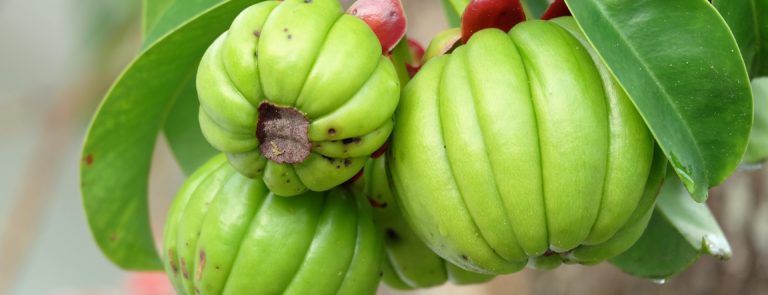10% off £35
Garcinia cambogia: Benefits, uses & side effects

Its name doesn’t exactly roll off the tongue, but could garcinia cambogia be the secret to weight loss and more?
This tropical fruit is widely used in herbal supplements and as a weight loss aid – but does it work?
In this article we’ll explore what garcinia cambogia is, how it’s used, as well as its benefits, dosage and any side-effects you should be aware of.
What is garcinia cambogia?
Garcinia cambogia fruit
Garcinia cambogia – sometimes called cambogia garcinia – is a tropical fruit, native to South and South-East Asia including Indonesia, parts of India and Sri Lanka.1
The small, robust garcinia cambogia fruit resembles miniature yellow or green pumpkins – but are sour and unpleasant when eaten raw.
Extract of garcinia cambogia
Extract of garcinia cambogia is made from the dried fruit rind.
As with most fruits, the rind is a concentrated source of vitamins, minerals and polyphenols.
Further, the fruit rind contains hydroxycitric acid (HCA) – the active component of garcinia cambogia which is thought to have anti-obesity effects as well as other potential health benefits.
Concentration of HCA in the rind is up to 30%.2
What is garcinia cambogia used for?
-
Cooking
In common use across South and South East Asia, the garcinia cambogia is a popular ingredient in food.
Garcinia cambogia fruits themselves have a sour taste and are unsuitable for consuming raw, but when dried they come into their own as a versatile condiment and spice, similar to tamarind.
Dried garcinia cambogia is used in food preparation to enhance dishes such as curries, fish and soup, and it’s believed they can make dishes more filling.3
-
Herbal supplements
If garcinia cambogia isn’t familiar to you as a cooking ingredient, you might recognise it as a key ingredient in popular weight loss aids.
Since the 1960’s, garcinia cambogia has been used widely throughout the world as a weight-loss supplement.
This is usually in the form of garcinia cambogia pills containing the herbal compound in powdered form, but garcinia cambogia teas, lotions and extracts are also available.4
It is the rind of the garcinia cambogia fruits that is used in herbal supplements. This is because it contains the highest concentration of hydroxycitric acid (HCA).5
Summary
- Garcinia cambogia is a tropical fruit with a strong, sour taste
- The dried flesh is used in cooking, and the rind is used in herbal supplements
- Hydroxycitric acid (HCA) is the active ingredient in garcinia cambogia, which is responsible for most of its benefits
8 benefits of garcinia cambogia
Garcinia cambogia benefits are said to include better fat burning, appetite control and overall weight loss.
As with any product which purports to offer miracle results, you should approach these claims with caution.
However, garcinia cambogia is relatively well-studied and there is clear evidence that it has helped people lose weight under controlled conditions.
Here are some of the ways garcinia cambogia could help you:
-
Fat burning
Garcinia cambogia’s reputation as a weight-loss aid is down to the active ingredient hydroxycitric acid (HCA).
HCA is a chemical found concentrated in the rind of the garcinia cambogia fruit. Scientists have found that HCA can help to metabolise fats in the body.6
Studies have found that garcinia cambogia is also capable of boosting the metabolic rate – which means that when taking it, we may burn more calories at rest.7
More calories burned at rest equates to more weight loss over time.
In one study on the potential weight loss benefits of garcinia cambogia, participants took 500mg garcinia cambogia twice a day.
After 6 months, the participants basal metabolic rate was measured and was found to have increased, possibly explaining the weight loss.8
-
Appetite suppressant
Another mechanism that garcinia cambogia may promote weight loss is by helping to prevent overeating.
It’s believed that garcinia cambogia supresses the appetite thanks to the active ingredient HCA.9
This has been demonstrated in several studies, and is thought to be down to the activity of HCA on chemicals in the brain.10
-
Overall weight loss
There are several studies which confirm that garcinia cambogia is effective at helping overall weight loss.
A 2003 study conducted in Japan found that after 16 weeks taking garcinia cambogia extract, participants had significantly reduced fat compared with those on the study who took a placebo.11
Another study from 2018 found that taking 1000mg garcinia cambogia every day for 6 months – without changing their other lifestyle factors – saw weight loss in the majority of study participants.12
-
Reduced visceral fat
Garcinia cambogia has also shown to be effective in helping people to lose visceral fat – the type of fat which accumulates inside the abdominal cavity and raises your risk of many diseases.
In one study, after 16 weeks of taking garcinia cambogia daily, people experienced a reduction in visceral fat without any negative side-effects.13
-
Exercise support
It’s been suggested that garcinia cambogia may be effective in helping athletic performance.
This is down to the HCA it contains. HCA supplementation has shown in studies to promote the utilisation of fat as an energy source, which helps preserve glycogen stores in the body.14
Glycogen stores are the main fuel for exercise endurance, so preserving them may help you work out for longer.15
-
Aided digestion
Traditionally, garcinia cambogia has been used as a digestive aid.16
Garcinia cambogia rind is frequently referred to in traditional medicinal literature as a remedy for bowel issues and diarrhoea, although research on this is lacking.17
-
Cholesterol reduction
Garcinia cambogia has shown to hold lipid-lowering properties in some studies. This means it could potentially be useful for lowering high cholesterol.18
A study published in 2018 in BMC Complementary and Alternative Medicine found that taking garcinia cambogia decreased levels of cholesterol in people’s blood, with no adverse effects found.19
-
Blood sugar control
Research has shown that HCA, the active ingredient in garcinia cambogia, can cause a reduction in blood glucose after meals.20 This is because it can slow the absorption of glucose by the small intestine.21
One study found an improvement in blood glucose profiles after subjects taking 1000mg garcinia cambogia daily for six months.22
Summary
- Studies have shown that garcinia cambogia might be effective at helping to reduce fat mass in those taking it
- It has also shown to help with blood sugar and cholesterol
- Garcinia cambogia may help with digestion and athletic endurance
Dosage
Wondering how much garcinia cambogia you should be taking? Keep reading to find out.
How much should you take?
Most studies have been based on 900 mg to 3000mg of HCA of garcinia cambogia daily.
Dosage recommendations on commercially available pills are generally lower, around 300mg – 1600mg daily.
It’s important to know that not all garcinia cambogia is created equal. The HCA content is key to the potential fat-metabolising action of this herbal compound. Your garcinia cambogia should have an HCA concentration of at least 50%.23
Always read the label on herbal medicines, and follow the manufacturer’s instructions with regards to dosage.
Garcinia cambogia side effects
In the clinical studies performed so far on garcinia cambogia, no serious adverse reactions have been commonly observed among participants.
The most common garcinia cambogia side effects are known to include headaches, digestive discomfort and nausea.24
However, outside of controlled studies, more serious side effects have been reported with garcinia cambogia use in the general population.
Garcinia cambogia has been reported as a potential hepatotoxic after several cases of liver damage after people took herbal supplements containing the fruit.25
Most cases were linked to one particular supplement available in the USA which was reformulated in 2004 and again in 2009.26
One review concluded that acute liver failure from garcinia cambogia supplement ingestion appears rare compared to their widespread use – although due to the reported cases, a risk of liver problems is present when taking garcinia cambogia.27
If you experience any unwanted side effects while taking products containing garcinia cambogia, stop taking them immediately.
Is garcinia cambogia safe for everyone?
Garcinia cambogia might affect the way some medications work. For example, garcinia cambogia might interact with anti-diabetic drugs, as it decreases both plasma glucose and insulin levels.28
It’s also thought to affect serotonin release, therefore isn’t suitable to be taken alongside SSRI anti-depressant medication.
If you are pregnant or breastfeeding you should not take garcinia cambogia pills as the effects on pregnant or nursing women is not yet known.
Due to their potentially hepatotoxic effects, garcinia cambogia products are not suitable for anyone with liver problems.
Due to their potential effect on the metabolism, they’re also not suitable for people with metabolic disorders.29
Garcinia cambogia – does it work for weight loss?
So, can we harness the weight-reducing benefits of garcinia cambogia by adding this herbal supplement to our diet?
Studies are promising, and so far there is some evidence which supports the idea that garcinia cambogia has anti-obesity effects.
Most of the studies used garcinia cambogia in conjunction with a healthy diet and/ or exercise, which should always be your first priority when it comes to weight loss and general health.
Conclusion
- Garcinia cambogia dosage can be anywhere from 300mg to 3000mg - always read the label.
- Side effects may include an upset stomach
- More serious side effects have been reported involving liver damage – don’t take garcinia cambogia if you’ve ever had liver problems
- It can interfere with some medications e.g. for diabetes and depression
Last updated: 8 July 2021
- https://www.nccih.nih.gov/health/garcinia-cambogia
- https://www.sciencedirect.com/topics/agricultural-and-biological-sciences/garcinia
- https://www.sciencedirect.com/topics/agricultural-and-biological-sciences/garcinia
- https://jamanetwork.com/journals/jama/fullarticle/188147
- https://www.nccih.nih.gov/health/garcinia-cambogia
- https://www.ncbi.nlm.nih.gov/pmc/articles/PMC5143754/
- https://bmccomplementmedtherapies.biomedcentral.com/articles/10.1186/s12906-018-2099-7
- https://bmccomplementmedtherapies.biomedcentral.com/articles/10.1186/s12906-018-2099-7
- https://www.sciencedirect.com/topics/medicine-and-dentistry/hydroxycitric-acid
- https://www.ncbi.nlm.nih.gov/pmc/articles/PMC3748738/
- https://www.ncbi.nlm.nih.gov/pmc/articles/PMC4053034/
- https://bmccomplementmedtherapies.biomedcentral.com/articles/10.1186/s12906-018-2099-7
- https://www.ncbi.nlm.nih.gov/pmc/articles/PMC4053034/
- https://pubmed.ncbi.nlm.nih.gov/15915661/
- https://pubmed.ncbi.nlm.nih.gov/21824444/
- https://pubmed.ncbi.nlm.nih.gov/25732350/
- https://www.longdom.org/open-access/the-biological-importance-of-garcinia-cambogia-a-review
- https://pubmed.ncbi.nlm.nih.gov/11881574/
- https://bmccomplementmedtherapies.biomedcentral.com/articles/10.1186/s12906-018-2099-7
- https://bmccomplementmedtherapies.biomedcentral.com/articles/10.1186/s12906-018-2099-7
- https://kosmospublishers.com/wp-content/uploads/2020/04/
- https://bmccomplementmedtherapies.biomedcentral.com/articles/10.1186/s12906-018-2099-7
- https://www.ncbi.nlm.nih.gov/pmc/articles/PMC3748738/
- https://www.ncbi.nlm.nih.gov/pmc/articles/PMC6683127/
- https://www.ncbi.nlm.nih.gov/pmc/articles/PMC5143754/
- https://www.ncbi.nlm.nih.gov/pmc/articles/PMC5143754/
- https://www.ncbi.nlm.nih.gov/pmc/articles/PMC5143754/
- https://www.ncbi.nlm.nih.gov/pmc/articles/PMC6683127/
- http://www.rimed.org/rimedicaljournal/2017/10/2017-10-48-case-bystrak.pdf














